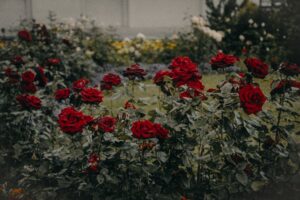
Today, in 2022, I am 14 years sober and very proud of my recovery. I feel compelled to help others understand what life is like on the road to recovery. In the early stages of an intervention families often ask, “What is it going to be like when they recover?”
My “rose garden relapse” story helps families identify and understand addictive behaviors that emerge later in recovery. The true story makes me look a little ridiculous, but my fiancés perspective of it all is a great example of how families view and react to addictive behavior.
Crazy for Roses
About a year ago I decided that I wanted to start a rose garden in the back of our house. When I pitched this idea to my fiancé Tony he looked at me like I was crazy. He said, “Absolutely not, they are pretty flowers but ugly plants.”
It was an honest reaction from Tony. We both knew that telling me I couldn’t do something would only green-light my addictive behavior. That week he left for a business trip and I went absolutely “rose crazy.”
My relapse behavior was in full bloom. I went to Home Depot several times to load up on bags of dirt and roses. I planted them and went running back for more. At night, I was up late researching how to caretake a rose garden. Tony would call and text to check in, but I would avoid answering. I was busy doing what I wanted.
Caught Red Handed
I was so engrossed with developing a prized rose garden that I didn’t even consider Tony’s reaction to my project. I couldn’t imagine the shock he would have when he came home to my mess, nor did I even consider that he would see the roses everywhere. None of it hit me until I turned around to my name being called from the patio door. It was Tony, and he was upset.
Letting him down gave me feelings of shame and guilt. I told him, “Don’t come back here, yet!” I thought up a lie to cover everything up, there was no denying my behavior. Tony was staring at the 16 rose bushes planted in our yard.
Caught red handed, I doubled down on my behavior. I tried talking him into seeing it my way, I wanted to plant even more. I told him, “It’s fine, you will see, they are going to be beautiful!” Tony wanted nothing to do with this subtle manipulation. I tried to bamboozle him by turning it around and claiming, “You never let me do what I want!”
Tony didn’t stop to smell any of the roses, he recognized the addictive behavior and told me that I needed to go to an AA meeting right away. At the meeting I shared my “rose garden relapse” with the room. Towards the end of the story everyone burst into a laughter that deflated my ego and caused me to realize my fixation over the garden was silly. I realized that I had let addictive behavior patterns take over, and that I owed Tony an apology.
Forgiveness
Tony has a great understanding of addiction, and he was forgiving. However, my rose obsession lived on quietly. During the winter I spent way too many hours researching rose genetics and care-taking. I learned about different varieties like Heritage roses and grew dissatisfied with my “cheap” Home Depot plants. How could I enjoy the backyard without Old Garden, Heirloom roses? In reality, I wasn’t studying a hobby. I was planning my next relapse. The day my local nursery received David Austin roses I purchased 16 to replace the ones in my garden.
When it comes to addictive behavior, I am somewhat grateful that I fell back into rose bushes and not substances. Tony was very sympathetic towards my feelings of anxiety and frustration, he knows that the glitch is part of my mental health. Together, we can observe this before and share concern as we see patterns emerge. The open communication we share prevents me from diving into obsessions that are even more expensive like renovating the kitchen or collecting vintage cars and motorcycles.
Even after 14 years without substance use I still exhibit addictive behaviors. They might diminish over time, but they are no doubt a part of the long road to recovery. My partner and I acknowledge the eccentric parts of my personality, and together we enjoy both my sobriety, and our rose garden.
About Adam Banks
Adam Banks is a certified interventionist and the owner of Adam Banks Recovery. After receiving an MBA from the University of Chicago, Adam built a company that was later acquired by United Health Care. His discipline and attention to detail comes from his former career as an airline pilot, holding an ATP, the FAA’s highest license.
Today, Adam is dedicated to helping others achieve long-term sobriety. His work has guided executives, pilots, and physicians on paths to recovery. Adam brings families together through a loving and inclusive approach.
Adam has authored four books on addiction. His recent work, Navigating Recovery Ground School: 12 Lessons to Help Families Navigate Recovery, educates families on the entire intervention process. He also offers a free video course for families considering an intervention for a loved one.
Adam is available for alcohol and drug intervention services in New York, Long Island, the Hamptons as well as nationally and internationally.

